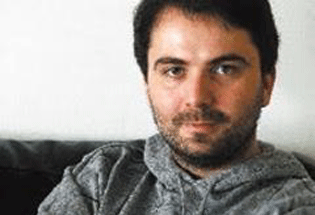Details Concerning the Detention of Serbian Journalist in the Self-proclaimed Republic of South Ossetia

Irina Aliashvili, media.ge
Who is Viktor Lazic? He's a Serbian journalist, author of two bestsellers, doctoral candidate and traveler, who writes about various cultures and nations of the world and people living in conflict regions. Lazic was detained on September 10, 2011 in the self-proclaimed Republic of South Ossetia, he remained in custody for almost a week.
The Serbian journalist told Media.ge via internet that he arrived in Georgia on September 3 and entered the territory of the self-proclaimed republic on September 9. After passing three Georgian and one Russian checkpoint he approached one more checkpoint near Tskhinvali.
"I approached the checkpoint and saw that the police officer was asleep there, I woke him up and asked what documents I needed in order to enter Tskhinvali. He told me I had crossed the border and walked 500 meters illegally. However, there was no indication whatsoever on that road that I was moving inside the South Ossetian territory" - the Serbian journalist says.
Law-enforcers of de-facto South Ossetian authorities detained Viktor Lazic without any explanations. He was kept in a cell where according to the journalist there was no electricity or water, he had neither basic hygienic appliances nor blankets or mattresses. There was blood splattered on the walls of the cell. He says he was given food irregularly as that question depended on the mood of his guards.
As his status was vague he was unable to hire a lawyer. "They were constantly telling me that I was not arrested but rather "temporarily detained". That status didn't give me the right to hire a lawyer or contact the family or embassy". However, Lasic still managed to secretly contact his embassy.
"The situation was pretty comic and in the long run I was very lucky. The Ossetians returned my cell phone as it didn't receive any signal at the place I was detained. However, on the third day when they moved me to another place the phone started to receive the signal. I assured my guards that the management of the prison had allowed me to make the phone calls, so I contacted the embassy, but they took my cell phone the last day anyway" - Viktor Lazic recalls.
The local law-enforcement bodies found out about the cell phone after the Serbian Embassy in Moscow and the employer of the journalist contacted the de-facto Minister of Foreign Affairs of South Ossetia and demanded Lasic's release.
"I'd like to add that I didn't know the phone number of the Serbian Embassy in Moscow. I called my employers and fiancé and got the number with their help. Besides, I learnt that Minister of Foreign Affairs of South Ossetia Mr. Jioev had forbidden the Embassy to contact me. The Serbian Consul was almost shocked when he heard my voice on the phone" - Lasic said.
The Ossetians suspected that the journalist could be a spy; therefore they were reluctant to release him. They were justifying this by the need to verify Lasic's identity. "However, that was not true" - the Serbian journalist says, "I had all kinds of documents, starting with ID card and finishing with the document certifying that I was a journalist".
Serbian Embassy in Moscow contacted de-facto Minister of Foreign Affairs of South Ossetia Mr. Jioev on the 4th day of Lasic's arrest. According to the Ambassador, he hadn't contacted the Ossetian side up until that moment because Serbia hadn't recognized South Ossetia as an official state.
According to Lasic, he had no contact with the Georgian authorities apart from conversations with a few Georgian police officers, who had warned him about possible complications. Head of Analytical Department of Ministry of Interior of Georgia Shota Utiashvili told Media.ge that negotiations regarding the release of the Serbian journalist took place for 1-2 days, however, he refrained from voicing the details of those negotiations.
Many international nongovernmental organizations published their addresses in connection with the detention of the journalist including Reporters without Borders, International Federation of Journalists, Association of Serbian Journalists, Association of Serbian Writers, Association of Serbian Bibliophiles etc.
"We appeal to the authorities in South Ossetia to free Lazic who is a well-travelled journalist and was there to do his job as a reporter," said Beth Costa, IFJ General Secretary at the time. "We are concerned about reports of harsh conditions in which he is detained, including solitary confinement, and urge his immediate release".
On September 16 Lazic was released without any explanations. The journalist is still unaware of the official reasons for his detainment.
"I wanted to write about the post-war life, I wanted to describe how people in South Ossetia and adjacent districts live, I wanted to describe their culture, lifestyle etc." - the journalist says. Despite the fact that he travelled to many conflict regions including Iraq and Kosovo, this situation was unusual for him.
Victor Lazic stayed with his colleagues in Tbilisi. He knew traveling to Tskhinvali region was problematic, but he didn't expect he would be arrested without a warning.
"I've been on frontlines many times and I've been caught in crossfire before, however, I've never been arrested anywhere. Since I never write about politics I didn't think I would create any problems to anyone with my activities" - Lazic said.
Viktor Lazic, Serbian journalist, doctorate candidate currently works for Press Daily Newspapers Belgrade. He's the author of two worldwide bestsellers; he was preparing materials for his employers in South Ossetia.
Original text



